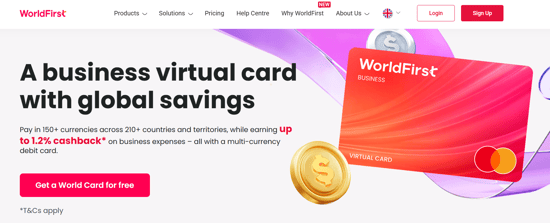
You've just landed that fantastic deal for your UK retail business – a $10,000 order of brilliant new stock from a US supplier. You've crunched the numbers, factored in shipping, and you're buzzing about the profit margin. But then, the bank card statement arrives. By the time the bank took its cut, you've paid nearly £8,150 instead of the £7,900 you budgeted for.
That tidy profit on your first big US order? Poof. Gone. It's a frustratingly common scenario for many UK e-commerce owners and importers.
The currency-conversion leak
Here's a right sneaky one that quietly chips away at your hard-earned cash. Loads of businesses, especially SMEs trading abroad, are losing an average of £1,000 to £5,000 a year just on international payment fees. This isn't just one charge; it's a combination of hidden FX spreads, double conversions, and bank surcharges.
When you pay a foreign invoice through a high-street bank, you can get hit with three separate fees: a transfer fee, a poor exchange rate, and even a receiving fee from your supplier's bank.
Let's break down the "spread" simply. It's that often-overlooked difference between the 'real' exchange rate you see on Google – the mid-market rate – and the less favourable one your bank gives you. That difference, usually a few percentage points, is their profit, and unfortunately, it's your unexpected cost.
It's like buying a meal at a restaurant and finding out the price on the menu isn't quite the price you're charged. Over time, these little discrepancies add up to a significant dent in your bottom line.
How a multi-currency card works

So, what’s the savvy solution? Enter the multi-currency debit card. Imagine having different "pots" of money in various currencies, all linked to one card. Instead of sending pounds abroad and incurring conversion fees, you simply hold dollars in a US dollar 'pot' and pay your American supplier directly from it, just like a local business would.
There's no double conversion, no surprise fees, and you maintain much greater control over your spending. It’s about making 'local-to-local' payments, even when you're thousands of miles apart. This significantly streamlines your international transactions and helps you avoid those hidden charges that eat into your margins.
For UK e-commerce owners, a multi currency debit card like the World Card from WorldFirst, which is authorised by the FCA as an Electronic Money Institution, is all you need.
This type of card allows you to pay in multiple currencies, often including GBP, EUR, and USD, without the constant need for conversions every time you make a transaction. You simply spend directly from the relevant currency balance, making international payments feel as straightforward as domestic ones. It's truly a doddle.
Three everyday "hacks"

Once you have a multi-currency card in your toolkit, a world of money-saving opportunities opens up. Here are three everyday "hacks" that UK businesses can leverage:
Pay USD ads directly
Many UK businesses spend a significant amount on online advertising platforms like Facebook or Google, which often bill in USD. Instead of letting your business bank convert your GBP into USD at an unfavourable rate, use your multi-currency card to pay directly from your USD balance. This completely bypasses those conversion fees and ensures your ad spend goes further.
Import stock in CNY, settle instantly
If you're importing goods from China, you're likely dealing with Chinese Yuan (CNH) invoices. With a multi-currency card, you can hold CNH in a dedicated wallet. When a supplier invoice arrives, you can settle it instantly from your CNH balance, avoiding the delays and costs associated with traditional international bank transfers.
Batch-convert when rates favour you
This is a bit of a strategic play. Keep a keen eye on the exchange rate. When it moves in your favour – perhaps the pound strengthens against the dollar or euro – you can choose to convert a larger batch of GBP to USD or EUR to lock in that great rate for future stock purchases or ad spend.
Rather than converting small amounts as needed, which means you're at the mercy of the daily fluctuating rate, you can make larger, more advantageous conversions when the market is on your side.
Quick roll-out checklist

Ready to plug those FX leaks? Here’s a five-step checklist to get you started:
- Choose a provider wisely: Look for a provider that offers no monthly account fees and transparent FX rates. Do your homework and compare options to find one that best suits your business's needs and transaction volumes. Transparency on fees is key to truly saving money.
- Open your wallets: Once you’ve chosen a provider, set up the currency wallets you need most frequently – likely USD, EUR, and perhaps CNH if you import from China. It’s usually a straightforward process within the provider’s platform.
- Set card limits: For better control and security, set sensible spending limits on your multi-currency card, just as you would with any business debit card. This helps manage cash flow and prevents unexpected overspending.
- Integrate with Xero (or similar): Many multi-currency card providers offer integrations with popular accounting software like Xero. This is a massive time-saver for admins, as it automatically logs your USD ad spend or EUR invoice payments directly into your GBP accounts, simplifying reconciliation and reporting.
- Review monthly: Make a habit of checking your multi-currency card statement every month. It’ll help you keep tabs on your savings, spot where your money’s going, and see if you could be smarter with your spending abroad.
Extra Money for Your Business
Sorting your FX leakage isn't just about saving money; it's free profit on every overseas sale. Stop letting the banks rob you on exchange rates, and suddenly you're playing a sharper game globally. Nail your currency swaps, and that extra cash stays in your business where it belongs. No more sneaky fees nibbling at your margins—just proper control and more money left at the end of the day.